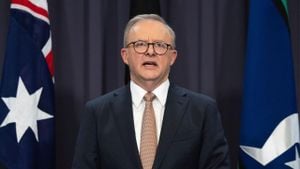Supporters of India's opposition party took to the streets of New Delhi on Monday to voice their displeasure over the U.S. bribery and fraud charges levied against billionaire Gautam Adani. The protests were fueled by the recent indictment of Adani, one of Asia's wealthiest individuals, and were driven by claims of governmental favoritism toward him from Prime Minister Narendra Modi's administration. Holding placards accusing Modi of complicity, protesters chanted slogans, signaling deepening political tensions as Adani's business empire faces scrutiny.
"Modi and Adani are one," read one placard. Demonstrators demanded immediate action against the tycoon, whose companies encompass various sectors, including coal, renewable energy, agriculture, and infrastructure. Meanwhile, opposition lawmakers attempted to bring the Adani allegations to the floor of Parliament but were met with disruptions, resulting in adjournments.
Gautam Adani's legal troubles intensified last week when U.S. attorneys filed charges against him and seven associates, alleging securities fraud along with conspiracy to commit wire fraud. The indictment accuses Adani of misleading investors concerning the ramifications of bribe-related contracts associated with one of his solar projects. The alleged scheme involves approximately $265 million paid to various Indian government officials to gain pivotal contracts and the potential for upcoming projects.
Adani’s conglomerate has pushed back against these allegations, with CFO Jugeshinder Robbie Singh labeling them as baseless. Singh noted during statements to shareholders and investors last week: "We have substantial confidence; not one of our companies is directly implicated. The recent indictment only pertains to Adani Green, which accounts for 10% of our business."
This debacle marks just the latest chapter for Adani, whose empire had previously faced accusations of fraud and stock price manipulations—the consequences from which had begun to reverse prior to this indictment, yet now threaten his business reputation amid plummeting stock prices.
Adani Group's standing across the Indian economy is significant, as the conglomerate operates India's largest network of coal mines and holds extensive interests across infrastructure, ports, and airports. Adani is also vocal about his commitment to transition toward renewable energy, aspiring to become the global leader by 2030.
Political figures, including Rahul Gandhi, leader of the main opposition Congress party, have publicly condemned what they term as the Modi government's defense of Adani through political interference, asserting, "The Prime Minister's credibility has been destroyed. The entire country knows they are one, and we will expose the entire financial network behind this." Such rhetoric aims to mobilize public sentiment against perceived corruption.
Market analysts suggest the timing of the new allegations is particularly damaging for Adani, considering his companies lost up to $27.9 billion in market capitalization over just two trading sessions following the U.S. indictment. After impacting shares heavily, the fallout forced analysts and investors alike to reconsider the firm’s stance and future prospects, leading to almost $1 billion loss at Adani Ports alone. By any stretch, the situation poses the most significant test yet for Gautam Adani, who only recently appeared to rebound from previous setbacks following earlier allegations.
While the Adani Group is still actively addressing the issues arising from this incident, leading investments and expanded contracts may be jeopardized as investor confidence wanes. With tensions between India's political factions rising, observers note the ramifications could ripple beyond the stock market.
The U.S. Securities and Exchange Commission has also entered the arena, filing charges against Adani for failing to provide accurate information about the status of its business dealings. They claim this case could have severe penalties attached, including monetary repercussions and limitations on company officers from engaging with public companies.
Analysts speculate these recent legal challenges signal serious headwinds for Adani’s considerable ambitions within renewable energy, as any forthcoming projects requiring financing might fall under increased scrutiny from foreign investors. The web of political connections and allegations of cronyism add layers of complexity to the task of attracting investment, particularly from sources wary of higher political stakes.
Responding to investor jitters, Singh reassured stakeholders by asserting: "Our legal strategies and business operations are sound, and we will comply fully with all investigative measures. Up until this, we maintained open channels with our partners and regulators; we assure you we will continue this rigor as we proceed." The clarity on operational protocols intends to restore some level of credibility among investors as the legal pathways forward begin to reshape transparencies surrounding company actions.
Moving forward, the coming weeks will be pivotal as the Adani Group attempts to navigate through these treacherous waters. With both U.S. and India regulatory entities actively involved, it remains unclear what the exact outcomes will be for Gautam Adani and his business empire, which operates under intense market pressure alongside increasing opposition scrutiny.
Whether the protests will translate to real political consequences for Modi and his party remains to be seen; for now, the allegations against Adani gather momentum as both sides prepare for looming legal criticisms. The response from investors and the market as they weigh the potential fallout from this scandal will be indispensable to watch.



